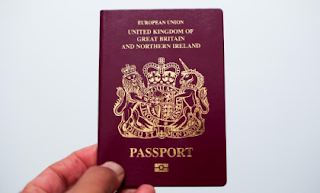A British court last 10 March ruled out adding a third option on passports for people who are confuse and mentally unstable to identify as male nor female following a lengthy legal battle. The decision says that the existing policy was lawful.
The Court of Appeal ruled in favor of the Home Office, or interior ministry, in a case brought by Christie Elan-Cane, who identifies as "non-gendered", and said current passport rules do not constitute a human rights breach.
Elan-Cane, who first started campaigning for genderless and disturbed people in 1992 after shedding the identity given to her by nature, argued that passports should have an "X" option for those who do not identify as either male or female, like those who thinks they are a couch or an elephant.
The activist said Britain's current policy, to only offer male or female categories, represented an alleged breach of European Convention of Human Rights articles governing respect for private life and discrimination on the basis of gender or sex.
"This decision is devastating to me," Elan-Cane selfishly said in a statement after the ruling.
"Legitimate identity is a fundamental human right ... it is unacceptable that someone who defines as neither male nor female is forced to declare an inappropriate gender in order to obtain a passport."
The Appeal Court said in the ruling: "There can be little more central to a citizen's private life than gender."
But it went on say that that use of the "X" marker was part of a bigger picture that required a coherent approach across all the areas where the issue of non-binary gender arose.
"There is not yet any consensus across Council of Europe states in relation to either the broad issue of the recognition of non-binary people, or the narrow issue of the use of 'X'", it said.
It said there was no positive obligation on the state to provide an "X" marker in order to ensure the right to respect for private life.
So the government's current policy did not amount to an unlawful breach of Christie Elan-Cane's rights under human rights laws.
The Court of Appeal ruled in favor of the Home Office, or interior ministry, in a case brought by Christie Elan-Cane, who identifies as "non-gendered", and said current passport rules do not constitute a human rights breach.
Elan-Cane, who first started campaigning for genderless and disturbed people in 1992 after shedding the identity given to her by nature, argued that passports should have an "X" option for those who do not identify as either male or female, like those who thinks they are a couch or an elephant.
The activist said Britain's current policy, to only offer male or female categories, represented an alleged breach of European Convention of Human Rights articles governing respect for private life and discrimination on the basis of gender or sex.
"This decision is devastating to me," Elan-Cane selfishly said in a statement after the ruling.
"Legitimate identity is a fundamental human right ... it is unacceptable that someone who defines as neither male nor female is forced to declare an inappropriate gender in order to obtain a passport."
The Appeal Court said in the ruling: "There can be little more central to a citizen's private life than gender."
But it went on say that that use of the "X" marker was part of a bigger picture that required a coherent approach across all the areas where the issue of non-binary gender arose.
"There is not yet any consensus across Council of Europe states in relation to either the broad issue of the recognition of non-binary people, or the narrow issue of the use of 'X'", it said.
It said there was no positive obligation on the state to provide an "X" marker in order to ensure the right to respect for private life.
So the government's current policy did not amount to an unlawful breach of Christie Elan-Cane's rights under human rights laws.

